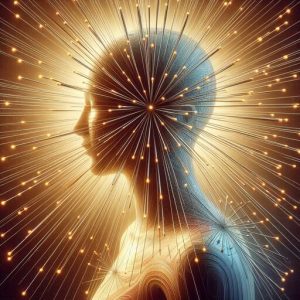Bridging Ancient Wisdom with Modern Healthcare
Acupuncture, a therapeutic technique rooted in Traditional Chinese Medicine (TCM), involves the insertion of tiny needles into specific points on the body. With origins dating back over 2,000 years, acupuncture aims to restore balance and harmony within the body’s vital energy, known as Qi. Today, acupuncture is gaining recognition and acceptance as an alternative therapy modality, reflecting a shift towards integrative approaches to healthcare.
Perspectives on Acupuncture’s Mechanisms
Acupuncture is viewed through two main perspectives: Traditional Chinese Medicine (TCM) and Western medicine. While TCM focuses on rebalancing Qi flow along meridians, Western medicine explores acupuncture’s physiological effects on nerve stimulation and pain modulation.
Traditional Chinese Medicine (TCM) Perspective
 In TCM, Qi is the vital energy that flows through meridians, influencing overall health. Acupuncture needles stimulate specific points to restore Qi flow and promote well-being. Meridians, conceptual pathways through which Qi flows, connect various organs and systems in the body. The smooth flow of Qi along these meridians is essential for maintaining health, while disruptions or blockages can lead to illness or discomfort. Acupuncture aims to regulate Qi flow by inserting needles into specific points along the meridians, promoting balance and harmony within the body.
In TCM, Qi is the vital energy that flows through meridians, influencing overall health. Acupuncture needles stimulate specific points to restore Qi flow and promote well-being. Meridians, conceptual pathways through which Qi flows, connect various organs and systems in the body. The smooth flow of Qi along these meridians is essential for maintaining health, while disruptions or blockages can lead to illness or discomfort. Acupuncture aims to regulate Qi flow by inserting needles into specific points along the meridians, promoting balance and harmony within the body.
Stimulating Qi Flow with Acupuncture Needles
Acupuncture needles are strategically inserted to stimulate Qi flow along meridians, promoting healing and restoring balance. The insertion of acupuncture needles is believed to stimulate sensory nerves, triggering a cascade of physiological responses. This includes the release of neurotransmitters and endorphins, which have analgesic and mood-regulating effects. Additionally, acupuncture needles may induce microtraumas in surrounding tissues, prompting the body’s natural healing response and enhancing circulation.
Potential Benefits of Acupuncture
Acupuncture offers diverse benefits, including pain relief, improved mood, enhanced immune function, and stress reduction. Research suggests that acupuncture may be effective in managing various conditions, including chronic pain, musculoskeletal disorders, migraines, anxiety, and depression. Many individuals report feeling relaxed and rejuvenated after acupuncture sessions, with improvements in both physical and emotional well-being.
Western Medicine Perspective
Scientific research supports acupuncture’s ability to modulate pain perception and induce the release of natural pain-relieving substances. According to Western medicine, acupuncture works by stimulating nerves, muscles, and connective tissues, leading to changes in neurotransmitter levels and pain signaling pathways. Studies have shown that acupuncture can be effective in reducing pain intensity and improving functional outcomes in conditions such as lower back pain, osteoarthritis, and fibromyalgia.
Research and Evidence
Numerous studies have demonstrated acupuncture’s effectiveness for various conditions, although ongoing research is needed to understand its mechanisms fully. Meta-analyses and systematic reviews have found acupuncture to be beneficial for pain management, nausea and vomiting associated with chemotherapy, insomnia, and menopausal symptoms. While some studies suggest that acupuncture may work by modulating the body’s neuroendocrine system, others emphasize its effects on local tissue responses and nerve signaling pathways.
What to Expect During an Acupuncture Session
Acupuncture sessions take place in a tranquil environment, with patients experiencing minimal discomfort during needle insertion. Various acupuncture techniques may be used to personalize treatment, including manual acupuncture, electroacupuncture, and auricular acupuncture. Patients can expect to feel relaxed and rejuvenated after an acupuncture session, with potential improvements in pain, mood, and overall well-being.
Additional Considerations: Safety and Qualifications
While acupuncture is generally safe, potential side effects such as minor bleeding or bruising may occur. Consulting a qualified acupuncturist is essential to ensure safe and effective treatment. Licensed acupuncturists undergo extensive training and certification to practice legally, ensuring proficiency in acupuncture techniques, anatomy, and safety procedures. Patients should also discuss any pre-existing medical conditions or medications with their acupuncturist before starting treatment to minimize the risk of adverse effects.
The FULL Article How Does Acupuncture Work? appeared first on MCR Therapies.
The Article How Does Acupuncture Work? Was Found On https://limitsofstrategy.com
The Article How Does Acupuncture Work? First Appeared ON
: https://ad4sc.com
Comments are closed